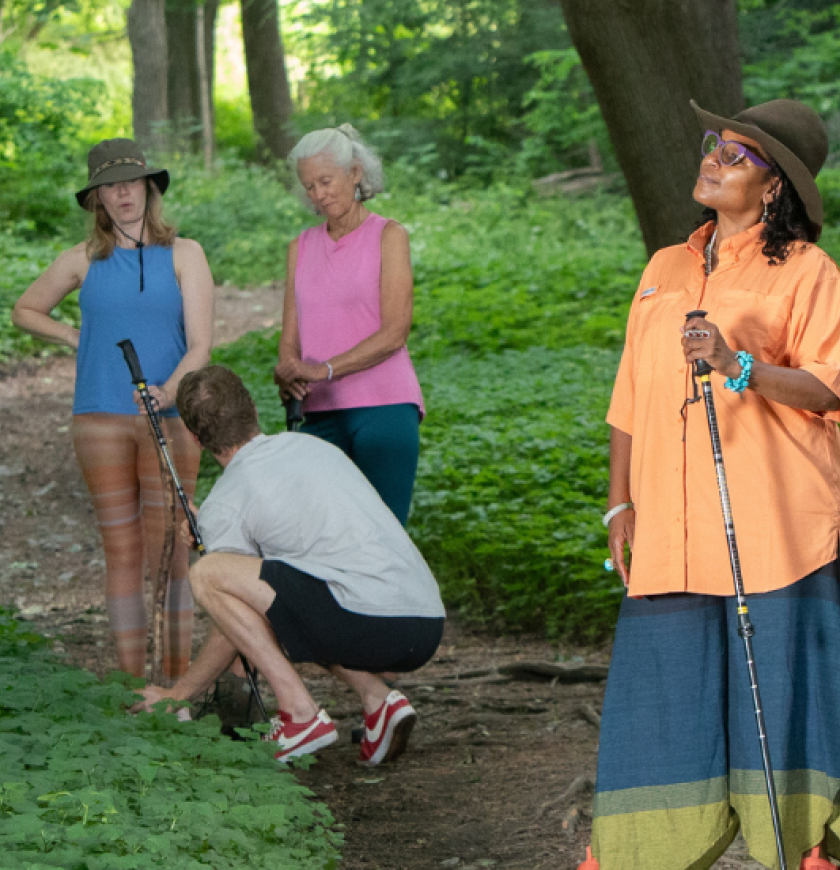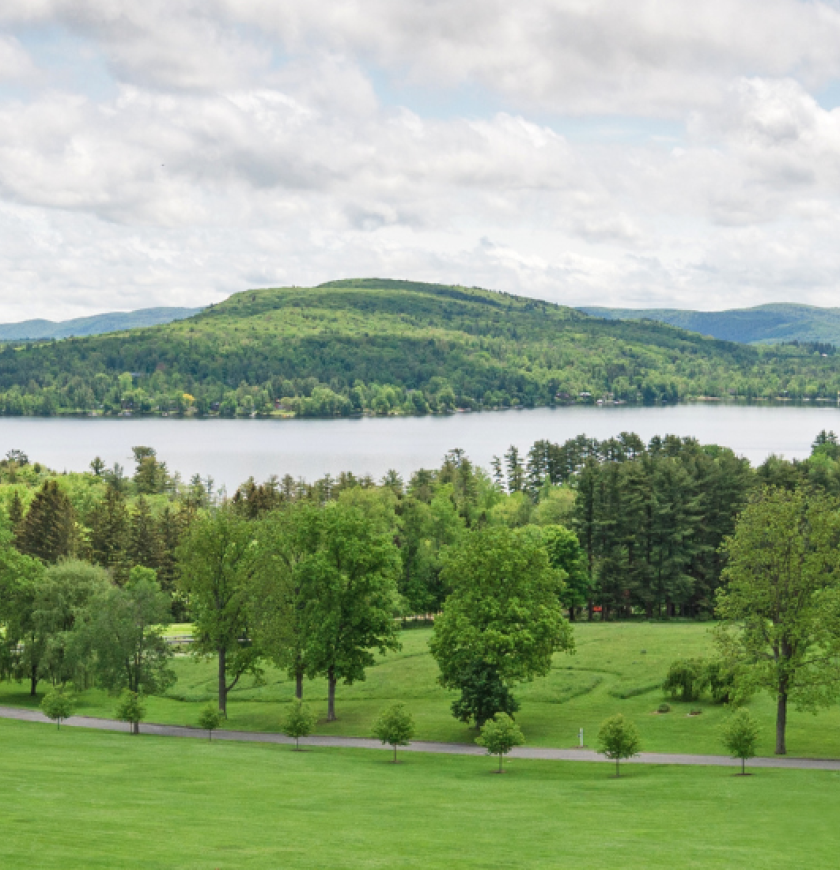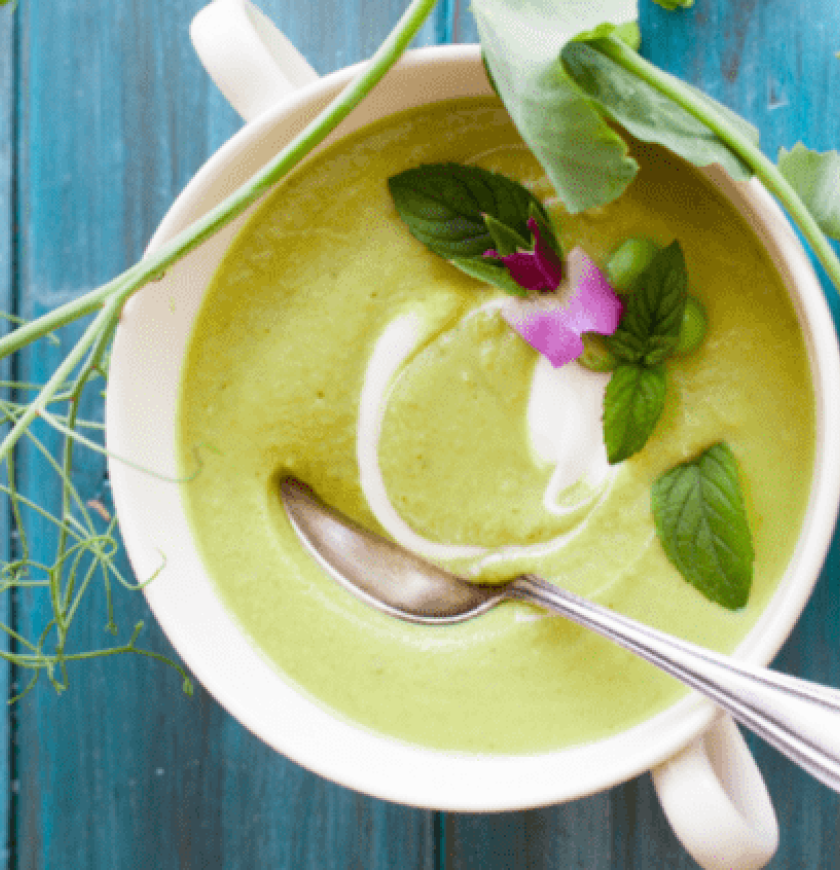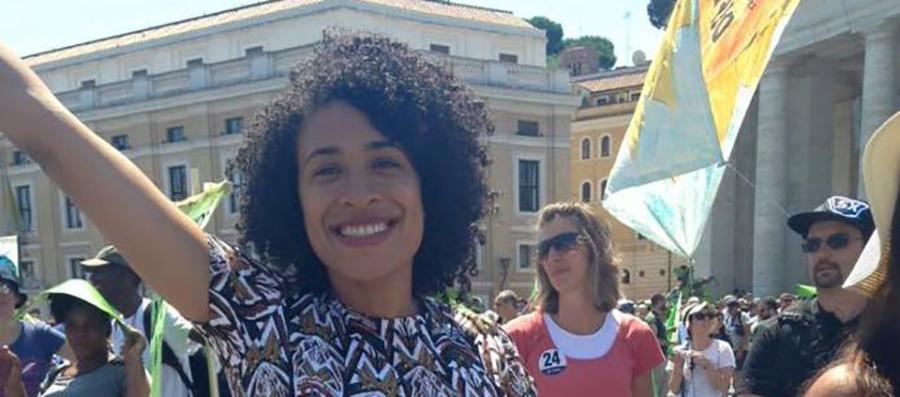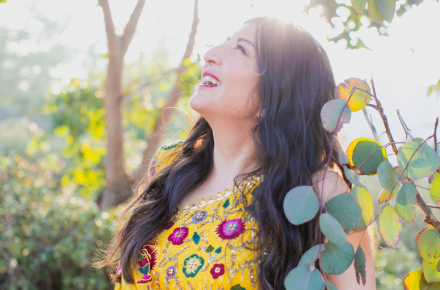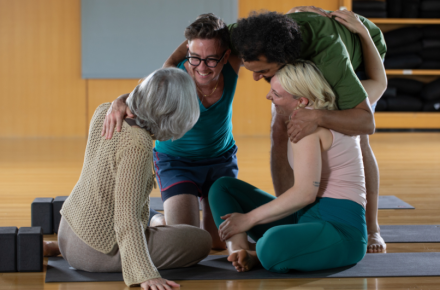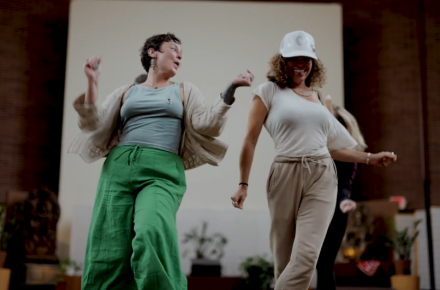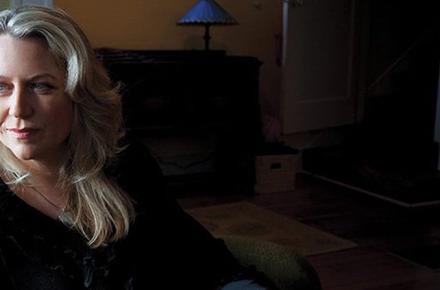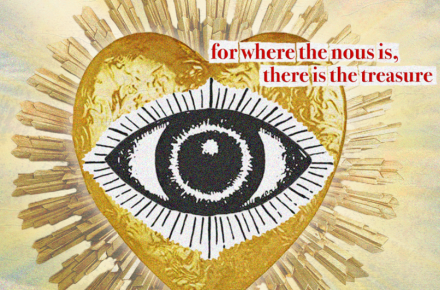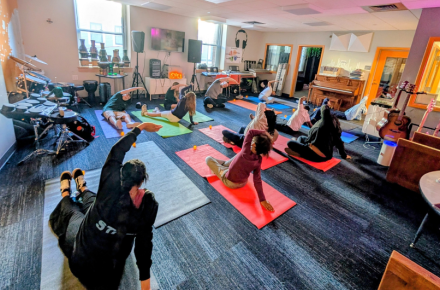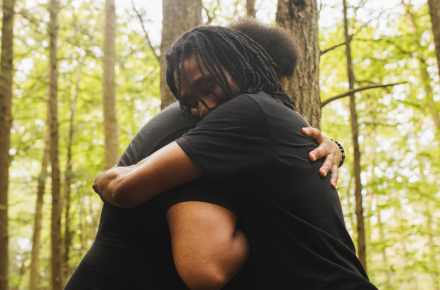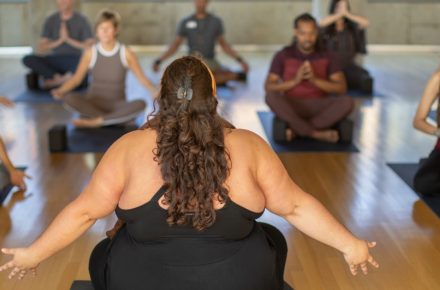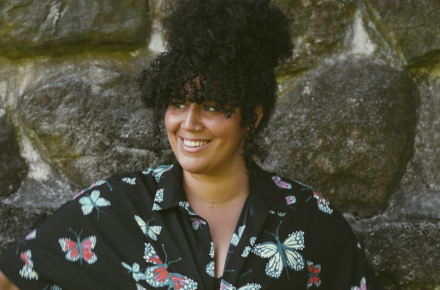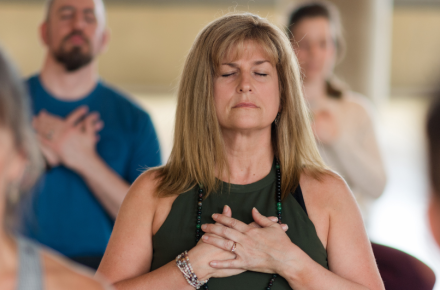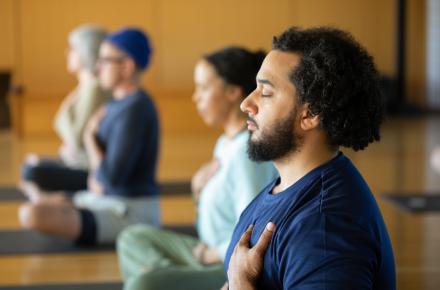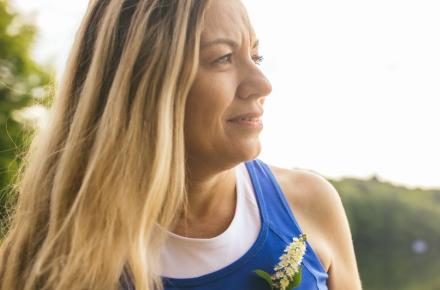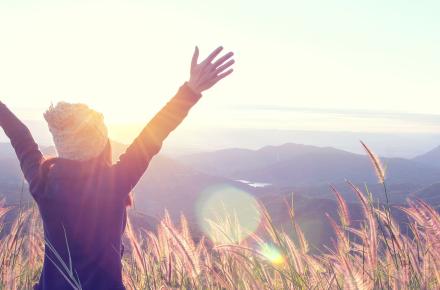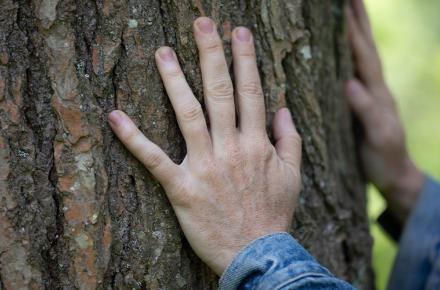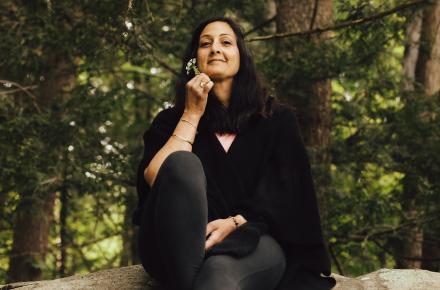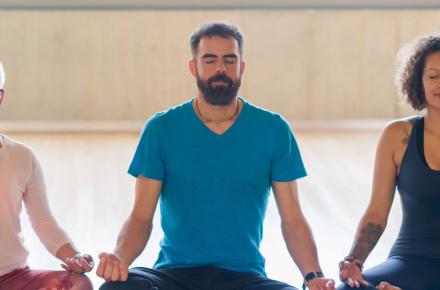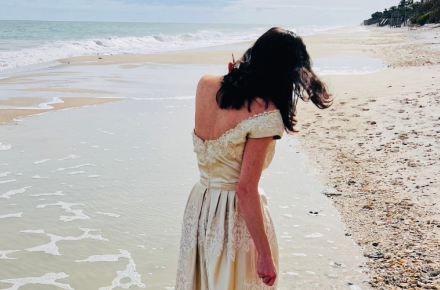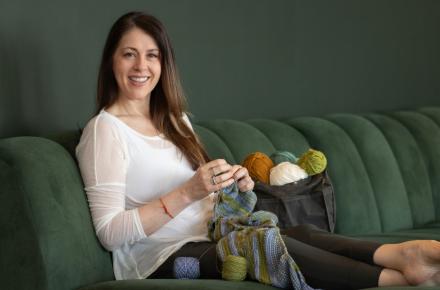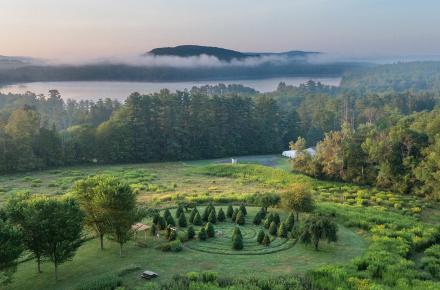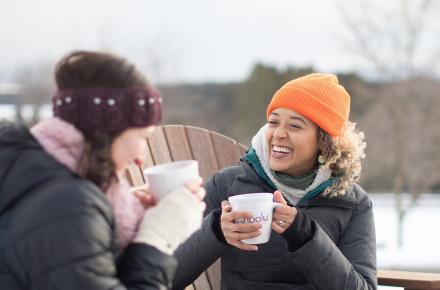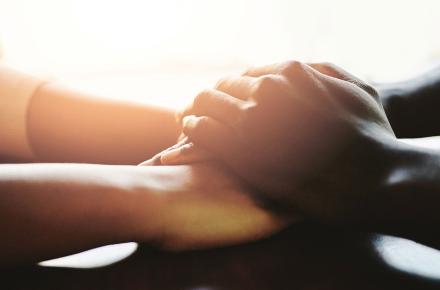Shifting the Yoga Paradigm: A Q&A on Music, Movement, and Healing with Leslie Salmon Jones
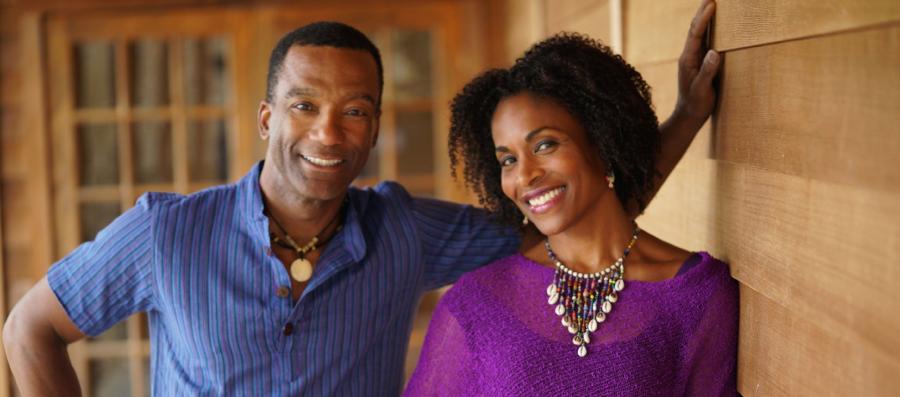
Kripalu presenter Leslie Salmon Jones was born to two change agents, and she’s continuing the legacy. The creator of Afro Flow Yoga®, which fuses yoga with the dance and traditions of the African diaspora, Leslie and her husband, musician Jeff W. Jones, offer this work in the United States and internationally. Informed by Leslie’s background as a professional dancer, holistic personal trainer, and wellness coach, the practice is a research-based technique for accessing joy and healing cultural and personal trauma.
As we mark Black History Month, we asked Leslie to share a bit of her own story and how it has informed the creation and evolution of Afro Flow Yoga.
Tell us about your personal history and what led you to this work.
I was born in Toronto, Canada, and I’m of Jamaican, Scottish, Irish, and Canadian descent. My dad was the first Black doctor to become Canada’s Chief of Surgery. He faced a lot of discrimination along the way to that position, and had to break through a lot of barriers. He was a pioneer in gastric bypass surgery, working with morbidly obese people for whom surgery was the last option. I grew up working in his office and I got to know many of his patients, and heard their stories and their struggles. My dad always made sure that they had a therapist and a nutritionist as well as physicians—he really took a holistic approach to wellness, which was revolutionary at that time.
My mom was a nurse and a community and human rights activist who was very invested in transforming communities, fighting for women’s rights, and bringing people from different backgrounds together. She was one of Canada’s first women of color to become a Metro Counselor—essentially an alderperson at the city level. She planted the seeds for me of understanding how important it is to heal ourselves and our communities.
I started doing ballet and Afro-Caribbean dance at age seven, and when I was a teenager, I went to New York City to train at the Alvin Ailey American Dance Center. For me, Alvin Ailey represented spirituality in motion—grace, dignity, and the healing power of movement and creative expression. I learned how art and dance impact the wellness of communities. Ailey insisted that all his dancers have a yoga background, so that’s where I was introduced to yoga, in 1991. I trained as a teacher at the Ailey studio and then at Jivamukti, which was just starting out then. I also studied exercise physiology and nutrition and became Reiki certified, and then I took all those practices and combined them. I had a studio in New York for 10 years beginning in the mid-‘90s, offering yoga and wellness coaching.
In 2007, you and Jeff traveled to West Africa to learn more about your ancestry. How has that exploration informed your work?
That trip was in many ways a homecoming, because that’s where our ancestors were taken from. It was so powerful to reconnect to the rich practices, wisdom, and traditions. I have a greater understanding now of what my ancestors went through, and a deep appreciation and gratitude for being here in this present moment because of their victories of survival and resilience.
Beginning with that trip, Jeff and I both did a lot of deep healing work around ancestral trauma—traveling to other regions of the diaspora, including Haiti and Jamaica; and learning about the interconnections between India and Africa and the migration and exchange of information that occurred. The lineage of Black history and the lineage of yoga are connected—in Egypt, scholars have found there is hieroglyphic evidence from the Nubian dynasty recording explorations into the science of yoga. One of the most prominent scholars in this area is Yirser Ra Hotep, who developed Kemetic Yoga, based on the ancient Egyptian yoga system.
Out of that exploration, along with everything I’d been studying and teaching, emerged the vision for what became Afro Flow Yoga, bringing together yoga and dance and incorporating live music. In Africa, there’s a proverb, “A tree without roots will fall.” The colonization process cut us off from our roots and our history, and these practices—the drumming, the dance, the yoga—help to heal that. When the memory of our lineage and history begins to awaken in the DNA and the cells, it gives people agency and freedom.
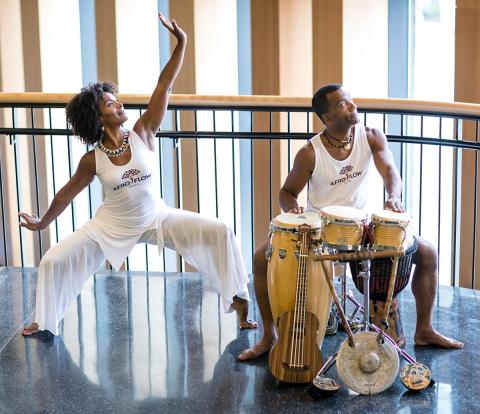
Could you describe how Afro Flow Yoga helps to heal trauma?
The practice can be done with people in chairs or on mats, however they need to show up, so it’s accessible to people who might not have a wide range of motion or might not be comfortable with yoga. As they practice and sink into the breath, they start accessing areas where trauma is held in the body, allowing them to release it. The music is a big part of it: Jeff plays 11 instruments, and the music he creates is designed to energize each of the chakras. Drumming in particular is very connected to the African tradition.
We’ve been doing trauma-healing work with people of many generations and colors and ages and sizes and abilities, from indigenous youth in northern Canada to parishioners at Roxbury Presbyterian Church in Roxbury, Massachusetts, working with Rev. Liz Walker and the Cory Johnson Program for Post-Traumatic Healing. We’ve now trained teachers who are sharing the practice all over—New York City and Boston, Canada and Israel. One of the biggest challenges of this work is building trust: We’re going into communities where people have been let down so often, by the government or the system, so it needs to be a slow, patient process. It’s so rewarding when people do begin to open up and move into their hearts within the safe space we’re creating. We give them a place where they can feel free in their bodies and free with their voices, knowing they won’t be judged or hurt during the process.
You’re on the board of the Yoga Alliance. How is the Alliance working to further diversity in the yoga space?
Ten years ago, when I started teaching at retreat centers, including Kripalu, there were very few people or presenters of color, and that has not changed much. We need to shift that paradigm. The Alliance board has created and committed to a vision and mission to bring more equity, unity, and accessibility into yoga. We’re in a time where there’s a willingness to become more culturally sensitive, and there are a lot of good intentions, but there’s also so much individual and systemic trauma that can be triggered, so the work of aspiring toward equity has to be deeply rooted in love, and requires grace and humility.
A couple of years ago, the Alliance put out the biggest yoga survey they’d ever done, and got feedback from the collective, so decisions are no longer being made by just a small group of board members. We’re at the stage where we’re beginning to put action behind the requests we heard in that survey. It’s not a perfect process, but it’s the beginning of something. We’re mindful of not simply imposing our own voices, of moving away from a dominant-culture or colonized way of thinking. Westerners are conditioned to work from “power over” rather than coming into a circle in which we can collaborate despite our differences. We’re not all the same—that idea turns a blind eye to the reality of people’s experiences.
Yoga means “union,” and Swami Kripalu, like many spiritual masters, spoke of the whole world as “one family.” Is that viewpoint too simplistic in today’s world?
I believe we are one human family. But if you think about your own family, even though you’re connected, you’re each unique and individual. It’s dangerous to assume that we have all had the same experiences or been treated in the same way; we have not all been treated equally throughout history nor are we all treated equally today, whether that’s a result of ethnicity or gender or sexual orientation. Yet, at the same time, we are all connected, and we can celebrate the beauty of our uniqueness and the beauty of that connection.

